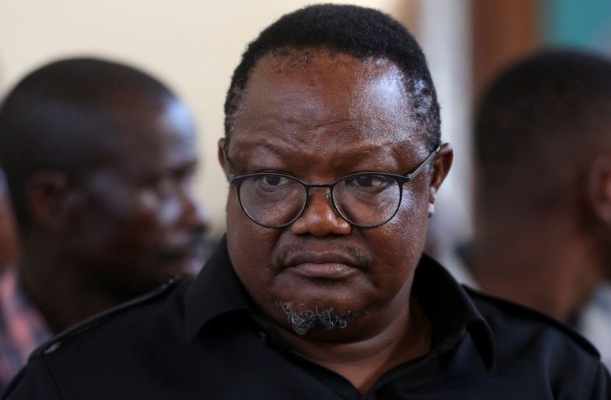Tundu Lissu, a Tanzanian opposition leader, faced sedition charges in court amid police restrictions blocking supporters and journalists. His party, Chadema, accused police of illegal raids on opposition homes. Lissu, facing politically motivated charges, and his supporters criticized the biased proceedings, raising concerns about repression ahead of Tanzania's elections.
Tanzania’s Opposition Leader Lissu Faces Sedition Charges Amid Crackdown


Tundu Lissu, a Tanzanian opposition leader, appeared in court on Monday to face sedition charges. However, armed police blocked access to the hearing, preventing dozens of journalists and supporters from attending. This action took place amidst accusations of unlawful police raids on opposition homes. Authorities closed Kisutu Resident Magistrate's Court in Dar es Salaam, setting up roadblocks and frisking individuals who attempted to enter. Reporters and members of the opposition Chadema party were forcibly removed from the courthouse without any explanation, prompting concerns about the state of press freedom in the country, especially with the upcoming elections.
Chadema, Tanzania's primary opposition party, has accused security forces of conducting an "illegal operation" overnight by raiding the homes of Tundu Lissu and Deputy Chairperson John Heche. According to a statement by Chadema, police officers raided Lissu's home in an attempt to conduct a search that was not legally justified. The statement further condemned the officers for using threatening language and actions, which violated both legal standards and human rights. It demanded an explanation from both the police and the government, questioning why officers attempted to carry out a nighttime search without a valid warrant or the presence of either the property owner or local witnesses.
During the court session, Senior Magistrate Godfrey Mhini rejected defense objections regarding procedural irregularities, including the court's previous attempt to hold the hearing remotely—something Lissu opposed. Lissu, who is a former presidential candidate and a longtime critic of the government, was arrested nearly a month ago. He faces charges of treason, incitement, and the spread of false information, which his party claims are politically motivated.
International defense lawyer Robert Amsterdam condemned the court proceedings, alleging that Tanzanian courts displayed clear bias against Lissu by rejecting all preliminary objections, including those against holding virtual hearings in a case that required transparency. He also highlighted the violent crackdown on protesters, stating that protestors have been beaten, arrested, and even killed. Amsterdam called for an end to this repression, emphasizing that much of Lissu's defense team has been denied access, violating his legal rights.
The case has attracted international attention, particularly as it occurs amid concerns of rising authoritarianism under the government of President Samia Suluhu Hassan. Human rights groups have repeatedly warned about growing crackdowns on political opponents, the media, and civil society. One Chadema member, barred from entering the courtroom, expressed frustration, calling the actions unconstitutional. Joseph Mussa, a supporter of Chadema who had traveled from Morogoro to attend the hearing, criticized the move, stating that it violated his constitutional rights. He argued that as a citizen, he had the right to attend public hearings and that blocking access without valid justification was an act of intimidation.
Lissu’s trial comes just months before Tanzania's local government elections, which are seen as a crucial precursor to the 2025 general elections. Opposition groups have warned that failure to uphold basic rights could undermine the legitimacy of the electoral process. The court's ruling on Monday is expected to have significant implications for the trial's progression, with observers closely watching for any signs of further repression or judicial independence.

 বাংলা
বাংলা  Spanish
Spanish  Arabic
Arabic  French
French  Chinese
Chinese 
